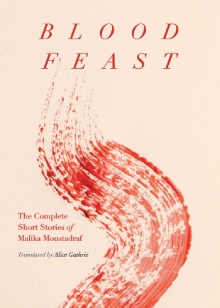 From Feminist Press | Blood Feast by Malika Moustadraf, translated from the Arabic by Alice Guthrie | Fiction | 128 pages | ISBN 9781952177897 | US$15.95
From Feminist Press | Blood Feast by Malika Moustadraf, translated from the Arabic by Alice Guthrie | Fiction | 128 pages | ISBN 9781952177897 | US$15.95
What the publisher says: “Delighting in vibrant sensory detail and rich slang, Moustadraf takes an unflinching look at the gendered body, social class, illness, double standards, and desire, as lived by a diverse cast of characters. Blood Feast is a sharp provocation to patriarchal power and a celebration of the life and genius of one of Morocco’s preeminent writers.”
What translator Alice Guthrie says: “This slim volume is but a snapshot of a gifted maverick writer in her ascendancy, creatively going from strength to strength even as her health deteriorated during the final weeks before her death. Had her life not been tragically cut short, Moustadraf would undoubtedly have gone on to reach great artistic heights.”
What I say: Sometimes visceral in its language, sometimes archetypal in its allusions, this collection covers a vast range of experiences over the course of its all-too-brief pages. The characters found within treat themselves badly, treat each other worse, and grapple with a hostile or indifferent society; via Moustadraf’s empathic rendering, though, their lives and circumstances come into focus and are often moving—but never losing that harrowing edge.
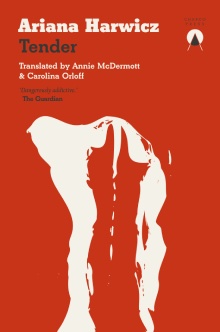 From Charco Press | Tender by Ariana Harwicz, translated from the Spanish by Annie McDermott and Carolina Orloff | Fiction | 120 pages | ISBN 9781913867126 | US$15.95
From Charco Press | Tender by Ariana Harwicz, translated from the Spanish by Annie McDermott and Carolina Orloff | Fiction | 120 pages | ISBN 9781913867126 | US$15.95
What the publisher says: “Under the spell of a mother’s madness, the French countryside transforms into a dreamscape of interconnected imagery: animals, desire, the functions of the body. Most troublingly: the comfort of a teenage son. Scorning the bourgeois mores and conventionality of their small town, she withdraws him from school and the two embark on ever more antisocial and dangerous behavior.”
What Publishers Weekly says: “Less a straightforward narrative than a stream-of-consciousness tour of the mother’s jumbled experiences, Harwicz paints a portrait of a troubled trio headed toward destruction.”
What I say: From its opening lines to its shocking conclusion, Tender makes for immersive but exhausting reading. In this translation by McDermott and Orloff, Harwicz’s prose is blistering and tactile: “A salty kiss with tongues and chewing gum just before the jolt. A liquid kiss in the gap of the lips.” To read this short novel is to be subsumed by the mind of its narrator and the delirious imagery found there.
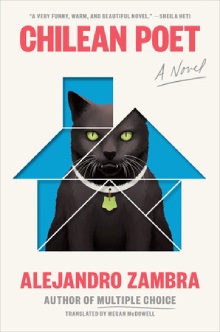 From Viking | Chilean Poet by Alejandro Zambra, translated from the Spanish by Megan McDowell | Fiction | 358 pages | ISBN 9780593297940 | US$27.00
From Viking | Chilean Poet by Alejandro Zambra, translated from the Spanish by Megan McDowell | Fiction | 358 pages | ISBN 9780593297940 | US$27.00
What the publisher says: “Exploring how we choose our families and how we betray them, and what it means to be a man in relationships—a partner, father, stepfather, teacher, lover, writer, and friend—it is a bold and brilliant new work by one of the most important writers of our time.”
What the New York Times says: “Chilean Poet is most compelling when it situates the minor dramas of the Latin American literati within the broader politics of how that identity has been constructed in the first place.”
What I say: After a number of formally innovative works, Zambra’s latest novel in English translation is (at least nominally) more traditional—but like the relationship between a man and his stepson at the center of the book, it’s also harder to pin down. The first half of the novel is more concerned with questions of family, while its second half takes a more meta-literary approach. All of which makes the experience of reading the English translation of a novel written in Spanish with a subplot about American perceptions of Chilean literature even more head-spinning…
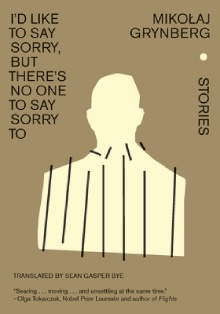 From New Press | I’d Like to Say Sorry, But There’s No One to Say Sorry To by Mikolaj Grynberg, translated from the Polish by Sean Gasper Bye | Fiction | 160 pages | ISBN 9781620976838 | US$19.99
From New Press | I’d Like to Say Sorry, But There’s No One to Say Sorry To by Mikolaj Grynberg, translated from the Polish by Sean Gasper Bye | Fiction | 160 pages | ISBN 9781620976838 | US$19.99
What the publisher says: “An exquisitely original collection of darkly funny stories that explore the panorama of Jewish experience in contemporary Poland, from a world-class contemporary writer.”
What Jewish Book Council says: “To achieve as much as he does in this slim and elegant volume, Grynberg forgoes traditional narrative conventions, such as scene setting and character description, and hones in on his characters’ vivid voices to evoke their sad, strange worlds.”
What I say: Grynberg’s collection and Blood Feast make for an interesting literary double bill. The protagonists and narrators of these stories have a tendency to involve themselves in bold declarations and circular arguments, as seen here: “You made up a few of those stories there, right? About half of them have got to be made up, which means the rest are true, right? Fine, it’s no business of mine anyhow; even without you I’ve got enough trouble on my own.” The result makes for a wide-ranging take on a haunting historical legacy.
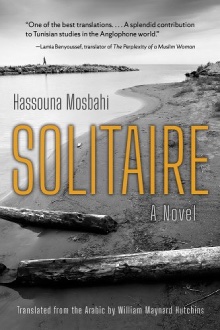 From Syracuse University Press | Solitaire by Hassouna Mosbahi, translated from the Arabic by William M. Hutchins | Fiction | 244 pages | ISBN 9780815611431 | US$24.95
From Syracuse University Press | Solitaire by Hassouna Mosbahi, translated from the Arabic by William M. Hutchins | Fiction | 244 pages | ISBN 9780815611431 | US$24.95
What the publisher says: “On the day of his sixtieth birthday, Yunus plunges into a delayed midlife crisis as he reflects on the major moments in his life, from taking up writing as a young man to his career as a university professor to his failed marriage. Yunus’s identity crisis mirrors that of his Tunisian homeland with its tumultuous history of political and cultural upheaval.”
What Asymptote Journal says: “Mosbahi’s book, in many ways, is a puzzle with no straightforward answers. It is encyclopedic and uneven and oblique. Stories proliferate, nestled within other stories, structurally echoing the classic Thousand and One Nights.”
What I say: Can one person’s life evoke the political turmoil and everyday experiences of an entire generation? Solitaire makes the case that it can. Mosbahi’s prose, in Hutchins’s translation, is endlessly allusive, shifting from its protagonist’s innermost thoughts to broader meditations on his region’s geopolitics and back again.
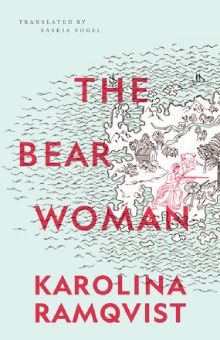 From Coach House Books | The Bear Woman by Karolina Ramqvist, translated from the Swedish by Saskia Vogel | Fiction | 224 pages | 9781552454312 | US$21.95
From Coach House Books | The Bear Woman by Karolina Ramqvist, translated from the Swedish by Saskia Vogel | Fiction | 224 pages | 9781552454312 | US$21.95
What the publisher says: “In the 1540s, a young French noblewoman, Marguerite de la Rocque, was abandoned by her guardian on an island in the Gulf of Saint Lawrence with her maidservant and her lover. In present-day Stockholm, an author and mother of three becomes captivated by the image of Marguerite sheltered in a dark cave all alone after her companions have died.”
What Foreword Reviews says: “Women’s stories often must be rescued from the margins of history, as a writer on a difficult research expedition is reminded in Karolina Ramqvist’s introspective novel The Bear Woman.”
What I say: We’re in the midst of an array of books in which writers and narrators grapple with the legacies of historical or artistic figures, and Ramqvist’s The Bear Woman is no exception. “Presumably this had to do with the incredible nature of the whole story, or at least how I interpreted it the first time I heard it,” the narrator recalls. “A friend had recounted it for me, a brief summary.” In those two sentences, the full scope of this book—its focus on storytelling, and its wrestling with alternate version of the same story—comes into focus.
Copyright © 2022 Tobias Carroll. All rights reserved.
Looking for more reading suggestions? Check out Tobias Carroll’s recommendations from last month.
Disclosure: Words Without Borders is an affiliate of Bookshop.org and will earn a commission if you use the links above to make a purchase.










